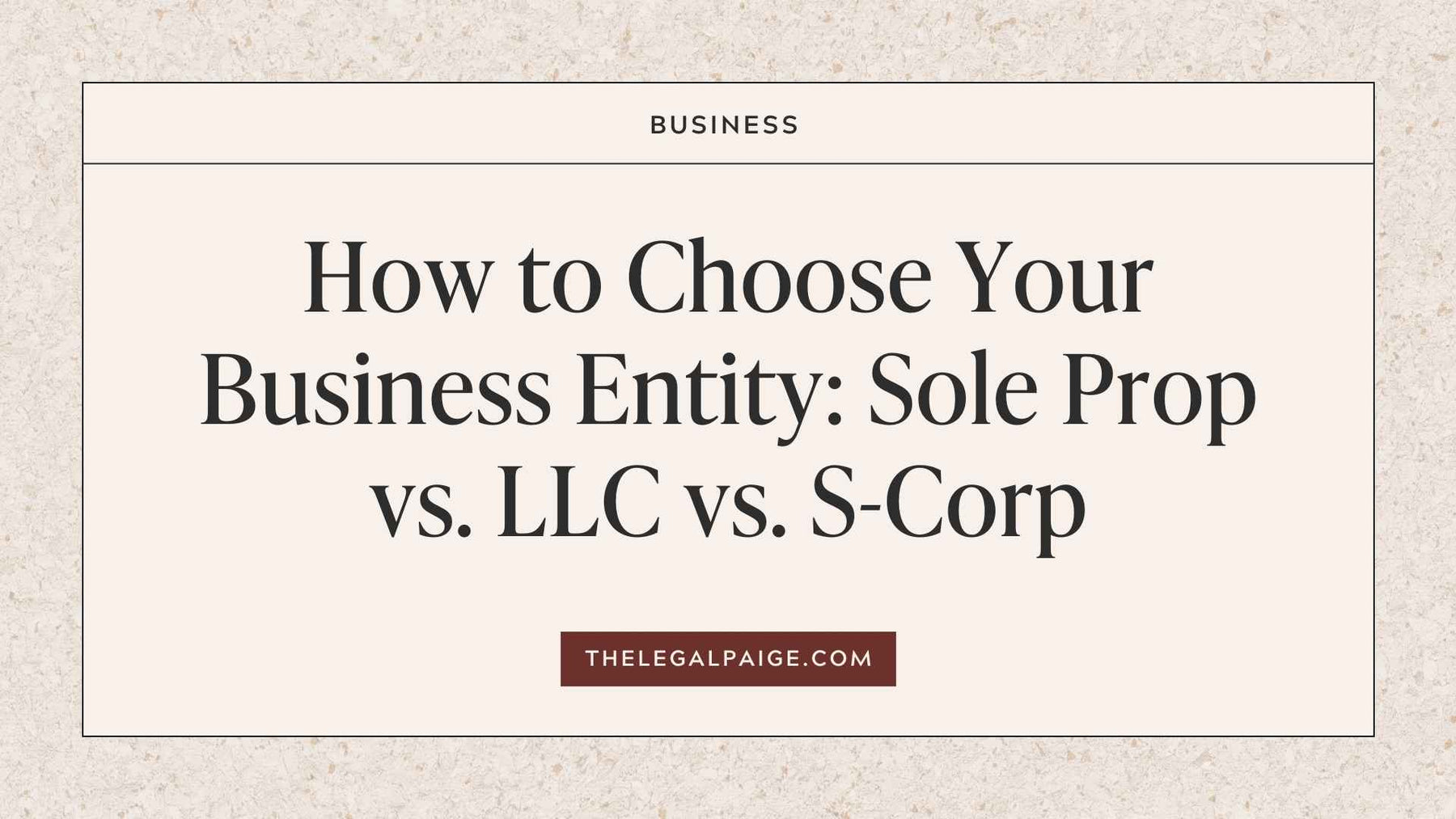
How to Choose Your Business Entity: Sole Prop vs. LLC vs. S-Corp
Are you a new, aspiring small business owner trying to figure out the ins and outs of legally starting your business? Are you someone that has a business plan in place and is ready to start making money but needs legal help to be prepared? Or maybe you’re hearing terms like “LLC” and “sole proprietor”, but are not sure of the difference? TLP is here to help guide you through these business structures and explain the legal protections of each. By the end of this blog, you will be able to confidently know which business structure is best for your unique business.
Main Business Structures
There are three main business structures that you will be dealing with when you are starting and growing your small business. These structures are:
-
Sole Proprietorship,
-
Limited Liability Company, and
-
S-Corporation.
These business structures are the most commonly used amongst smaller businesses… so if you are an established business owner with upwards of 50 employees these business structures may not work for you and you should talk with your accountant and lawyer about additional options. Let’s get into the difference between each of these three and their advantages and disadvantages.
Sole Proprietorship
A sole proprietorship is a business structure that does not separate assets and liabilities from you as the owner. That means YOU are responsible for debts, incurred costs, and other obligations of your business and can be personally liable for any issues that arise. Your business is not a separate entity but rather you as the business owner are personally responsible for it.
Being a sole proprietor is the default business formation for tax purposes immediately when you start a business; meaning you are automatically a sole proprietor when you open the *virtual* doors to your business and you DO NOT have to file or register with the state in order to become a sole proprietor (like you would if you want your business to be an LLC). This is a great place to start if you are just beginning your business, have little liabilities or risks involved in the services you are performing, consistently move around to various states, and/or are the sole member of your company. This is because there are no formalities to this type of business structure and no obligations on your end to maintain your legal status. You just simply are a sole proprietor and will report your income from your business through your social security number on your own personal tax return at the end of the year. But, the minute you start seeing your business grow substantially you may then want to switch from a sole proprietorship to an LLC.
Limited Liability Company
“LLC” or “L.L.C.” stands for “Limited Liability Company” and is one of the most popular business entities for small business owners. (**SIDE NOTE: A sole proprietorship and an S-Corporation are NOT business entities, they are just a type of business structure and tax status, respectively.) An LLC is the most utilized because it is the simplest business entity to form, and provides small business owners more protection for their personal assets. An LLC is formed by creating a company (a corporation) that acts as its own legal entity and has its own rights outside of any owners or agents of the company. This provides owners of the company with ‘limited liability’ regarding business decisions (…hence the name), such as being not personally liable for any debts incurred by the LLC and only being liable for most business-related lawsuits. Essentially the LLC will act as a shield or additional form of protection for owners to protect their personal assets from business-related issues. However, running an LLC is more complicated and requires your business to be truly separate from the owners' personal expenses, accounts, assets, etc. than other formations such as sole proprietorship. Thus, you HAVE to have your own EIN number and separate bank account.
There are two types of LLC structures, Manager-Managed LLC and Member-Managed LLC. A Member-Managed LLC is where every business member shares the responsibilities and burdens to collectively manage the business. A Manager-Managed LLC, on the other hand, is when only a small, select number of people are designated as managers of the business. If you want to know more about Manager-Managed LLC vs. Member-Managed LLC read all about it HERE!
S-Corporation
Ok so this may come as a bit of a shock but … an S-corporation is actually NOT a type of business formation or entity, but rather a tax designation. In order to be an S-Corporation, you must first form your business as a Limited Liability Company for legal purposes. From there, if you meet certain requirements, you can elect to designate your business as an S-Corporation for tax purposes.
So, what does that mean? If you choose by default to have your LLC taxed as a sole proprietorship, this means that as a business owner you are required to report business income and expenses on your personal income tax return, pay personal income tax on company profits AND pay Social Security and Medicare taxes on said profits. HOWEVER, If you choose instead to have your LLC taxed as an S-corporation, your "reasonable salary" will be a business expense so you will ONLY pay self-employment taxes (Social Security and Medicare) on your "reasonable salary"! The additional business profits will not be taxed for self-employment purposes (but will still be taxed for all other state and federal income taxes), so you could save a substantial amount of money each year in tax liability. Just know that when you become an S Corporation you do have to put yourself as the owner on payroll (and pay for someone to run payroll or get a payroll service) and you will have to file two tax returns (one for your S Corp and one for your personal taxes).
An S-Corporation is a great growth step for businesses that have seen steady sales, and expect a profit margin well beyond what the “reasonable salary” would be in your region for the work you do, and/or have or want to grow by hiring more employees. Definitely talk to a lawyer and accountant in your specific state for assistance on designating as an S Corp and if its a good step for you as a business owner.
TLP Take
For a quick summary:
-
If you are just starting your business and don't have many customers, don’t make much in terms of liabilities with past/current/future clients and risks involved in your services, do not have employees it is okay to start out with the default business structure of a sole proprietorship.
-
Once you see your sales go up and are considering expanding your business with employees, contractors, more customers, and more sales, inherently you are adding on more liabilities and risks involved in what you are doing and you absolutely should consider registering that business as an LLC to protect your personal liability and assets.
-
Finally, if your business is growing to where you have a few employees, have a lot of profit margin (such as GROSS profit within the $50-100k range), and/or you are wanting to scale your business even more, it may be time to designate your LLC as an S-Corporation through the IRS.
Now that you are an expert in knowing the difference in basic business structures, you know TLP is still here to help you navigate through registering your business.

Join the Community
Be a part of 8000+ TLP Community Members in this safe space and get real-time answers from Paige and her legal team daily!

Leave a comment